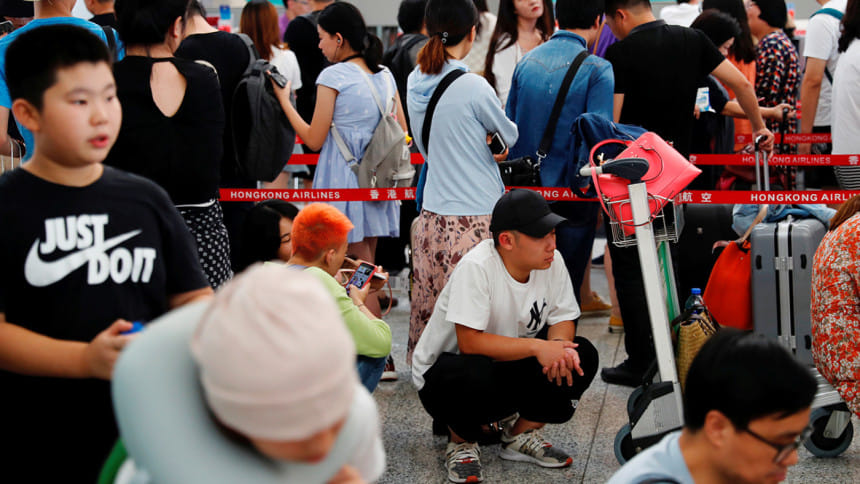Strike grips Hong Kong

-- Lam reiterates protests pushing city to 'dangerous situation'
-- Warns that some protesters 'challenging China's sovereignty'
-- HK leader speaks amid transport chaos as protesters call strike
-- Hundreds of flights cancelled, long lines of traffic
-- More arrests overnight after 'flash' protests
Hong Kong was plunged into fresh chaos today as a general strike followed another weekend of violent protests, paralysing transport, leading to more than 200 flight cancellations and bringing the city to an unprecedented standstill.
Beijing-backed leader Carrie Lam addressed the media for the first time in two weeks and warned again that the protests gripping the city are a challenge to China's sovereignty and pushing it to the verge of an "extremely dangerous situation".
Embattled Lam remained defiant as she rejected calls from protesters for her to resign and said the government would be resolute in maintaining law and order.
She warned the protests were putting the Asian financial centre on a path of no return and had hurt the city's economy.
"They claim they want a revolution and to restore Hong Kong, these actions have far exceeded their original political demands," said a stern-faced Lam, who was flanked by senior members of her administration.
"These illegal acts that challenge our country's sovereignty, and jeopardize 'one country two systems', will destroy the stability and prosperity of Hong Kong," she said, referring to Hong Kong's administrative system since 1997 when the former British colony was handed back to China.
In her first news conference since July 22, Lam said the protests are "pushing our city, the city we all love and many of us helped to build, to the verge of a very dangerous situation".
Some protesters accused Lam of again fuelling the crisis by ignoring public sentiment, and they pledged to continue with their movement.
"It is totally a waste of time to hear" her speak, said Jay Leung, 20, a university student.
"I don't think the government is doing anything to heal society," he added. "They provide no solution to solve the political problem brought on by themselves. Why doesn't the government reflect its performance?"
The Chinese-controlled city has been rocked by months of protests that began against an extradition bill that would have allowed people to be sent to mainland China for trial and have since evolved into a broader backlash against the government.
Commuters struggled to get to work in the Monday morning rush hour before Lam spoke, with many rail and bus services suspended, while some activists blocked trains from leaving stations, some by sitting between train doors, in the latest anti-government campaign.
Long lines of traffic could be seen across Hong Kong island leading into the heart of the business centre and hundreds of people were stranded at the airport. Roads into the main arteries of Hong Kong were paralysed.
The Airport Express train service was temporarily suspended.
"(The government) are making police the scapegoat and creating a situation that is becoming unbearable for everyone who lives here. So that's one of the reasons we have joined the strike," said Mark Schmidt, 49, who closed his business on Monday.
"Losing a bit of money now is not such a problem,(compared) with losing everything that the freedom of Hong Kong used to stand for," he added.
More protests are planned in seven districts across the former British colony on Monday.
Lam focused mainly on the violence at the protests, which have galvanised people from all walks of life and led to support rallies by civil servants, teachers, lawyers, religious groups, among other groups.
FLASH MOB
Police arrested 44 people after sometimes violent clashes overnight when police fired tear gas to disperse demonstrators who moved swiftly across the city in flash mob-style actions.
Demonstrators besieged police stations across the city over the weekend, spray-painting walls with graffiti and breaking windows. Some set fire to a trolley of rubbish bins and wooden planks and pushed it towards a police cordon line.
Police said in a statement the violence was escalating rapidly and the situation was spiralling out of control.
The protests have at times shut government offices, blocked roads and disrupted business, posing the greatest political challenge to the former British colony since it returned to Chinese rule in 1997.
Millions of people have taken to the streets to vent anger and frustration at the city's government, presenting the biggest popular challenge to Chinese leader Xi Jinping since he came to power in 2012.
The government has so far refused to accede to any of the protesters' main demands, which include a complete withdrawal of the extradition bill and an independent inquiry into government handling of the snowballing crisis.
Hong Kong tourism numbers are already falling and hotel occupancy rates are slumping as the protests take a toll, adding pressure to Hong Kong's already struggling economy.
"I know the whole thing and I support the resistance very much. But this is not the way to win friends and influence people. It is (hurting) innocent bystanders," said Canadian retiree Edward Tunis, 66.
IHS Markit's latest Purchasing Managers' Index for Hong Kong showed private sector business activity dropped to its lowest level in a decade, weighed down by the protests and the Sino-US trade war.
New orders also contracted the most since March 2009, the data showed.
Hong Kong Financial Secretary Paul Chan said on Monday the city's economy was facing large downward pressure.
The benchmark Hang Seng Index fell 3 percent, outpacing losses in other Asian markets.

 For all latest news, follow The Daily Star's Google News channel.
For all latest news, follow The Daily Star's Google News channel. 








Comments